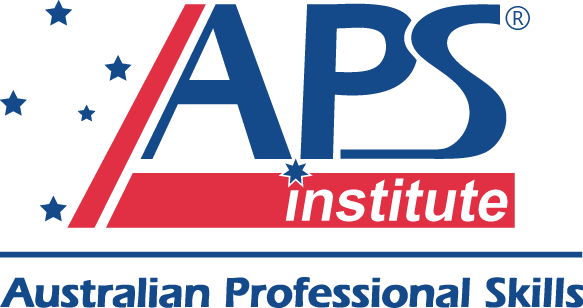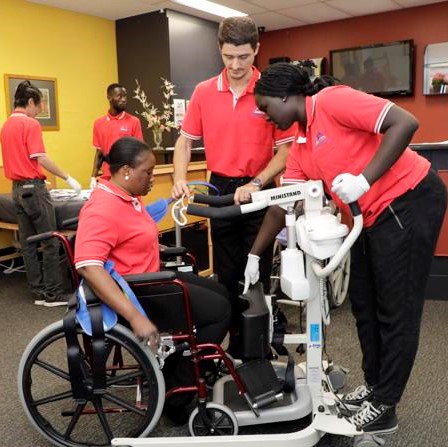
Certificate III in Individual Support (Disability)
 CRICOS Course Code: 113104H
CRICOS Course Code: 113104H
VET National Code: CHC33021
Course Description
The Certificate III in Individual Support (Disability) course provides the required training to work in a community and/or residential workplace, offering support to people with disabilities. The growing disability sector is a valuable and fulfilling industry and offers a range of career paths.
Almost 20 percent of Australians have a disability (3.96 million people, or 1 in 5). This may be any condition that restricts a person’s mental, sensory or mobility functions. It may be caused by accident, trauma, genetics or disease. A disability may be temporary or permanent, total or partial, lifelong or acquired, visible or invisible.
People with disabilities are living a lot longer as medical support and resources are readily available in Australia. Therefore, the demand for skilled workers is greater now than ever before. This qualification delivers the skills and knowledge required for working in the community and/or residential settings providing person-centred support to people with disabilities in everyday living tasks, recreation and leisure, accommodation support, skills development, recreation and respite care.
People with disability have the same rights as others to participate in community life. It is important that services and facilities are accessible for them. As a Disability Support Worker you are assisting people to access all services that are available to everybody living in Australia and improve inclusion of people with a disability.
This Certificate III in Individual Support (Disability) course is delivered via face to face training in a classroom environment with simulated practical tasks carried our practical room, followed by 160 hours of workplace training arranged by Australian Professional Skills Institute.
Career Outcomes
- Personal Care Worker
- Assistant in Nursing
- Community Care Worker
- Disability Support Worker
Course Admission Requirements
Australian Professional Skills Institute is CRICOS registered (CRICOS Provider Code 03255G). All students must be over 18 years of age before they can commence this course at APSI.
Domestic Australian Students
- For Certificate level courses, students must have completed a minimum of Year 10 schooling or equivalent or to be a mature age student (20 years of age and above).
- Students need to demonstrate they have proficiency in English. If students cannot provide documented proof of their English language proficiency, they will be required to sit for a Language, Literacy and Numeracy test (LLN) before a place can be offered.
- Find out if you are eligible for the government funded Certificate III in Individual Support fees.
- This course is approved by the Department of Human Services (Centrelink) for student payment. Domestic students who meets the requirements of an approved course of education and study may be eligible to receive student payment from the Department.
- Additional requirements below.
International Students
- This course is available to international students on a higher education student visa as their concurrent/ secondary course.
- Students need to demonstrate they have proficiency in English. If students cannot provide documented proof of their English language proficiency, they will be required to sit for a Language, Literacy and Numeracy test (LLN) before a place can be offered.
- International students are required to have a minimum of IELTS test results of 5.5 (academic) with no individual band lower than 5, or achieve an equivalent in other forms of testing that satisfy the Institute’s requirement. If an international student does not have any current IELTS score or any recognised English language result, they are required to take an English language test.
- For Certificate level courses, students must have completed a minimum of Year 10 schooling or equivalent or to be a mature age student (20 years of age and above).
- Additional requirements below.
Note: International student studying a concurrent/secondary course on student visa
An overseas student in Australia on a student visa is permitted to undertake additional study at the same time as the principal course. However, any course undertaken by a student visa holder must be registered on CRICOS. A Confirmation of Enrolment (CoE) is also required for any additional study in a course undertaken by an overseas student whilst in Australia on a student visa. APSI is a registered CRICOS provider which accepts international student undertake this course as their secondary course.
Additional Requirements
- All Certificate III in Individual Support students must be willing to apply, or already hold, a current National Police Clearance (not older than 3 months at time of enrolment). This is COMPULSORY for students/candidates to undertake workplace training. A National Police Clearance can be acquired from any Post Office for a small fee. Please allow 3 weeks for delivery. Students cannot attend work experience without this.
- All learners are required to wear an APSI uniform while attending workplace training in accordance with APSI Aged Care and Community Services Dress Code.
Units of Competency
This Certificate III in Individual Support (Disability) course consists of units of competence, including core units and elective units, as listed below:
Unit Code |
Unit Name |
Core Units |
|
| CHCCCS031 | Provide individualised support |
| CHCCCS038 | Facilitate the empowerment of people receiving support |
| CHCCCS040 | Support independence and wellbeing |
| CHCCCS041 | Recognise healthy body systems |
| CHCCOM005 | Communicate and work in health or community services |
| CHCDIV001 | Work with diverse people |
| CHCLEG001 | Work legally and ethically |
| HLTINF006 | Apply basic principles and practices of infection prevention and control |
| HLTWHS002 | Follow safe work practices for direct client care |
Elective Units |
|
| CHCDIS011 | Contribute to ongoing skills development using a strengths-based approach |
| CHCDIS012 | Support community participation and social inclusion |
| CHCDIS020 | Work effectively in disability support |
Students can also acquire a dual qualification – Certificate III in Individual Support (Ageing, Home and Community) by taking the following extra units:
Additional Units |
|
| CHCAGE011 | Provide support to people living with dementia |
| CHCAGE013 | Work effectively in aged care |
| CHCPAL003 | Deliver care services using a palliative approach |
Our Teacher Jacky is a very beautiful, supportive, professional and well-experienced trainer and most importantly she has a warm and welcoming heart. She has great passion in what she is doing which set up a role model for someone like who never know too much about age care.
I had a wonderful and happy learning environment in APSI. All the people here are lovely and welcoming.
I highly recommend anyone who is interested in learning some new skills or if you want to be a carer or be professional in any other professional skills, come to APSI. This is a place that you can improve your skills or into another career and make some new friends
Entry Requirements
Completion of Year 10 or equivalent with upper immediate level of English, or minimum IELTS score 5.5 (no band less than 5.0) or pass the Institute’s literacy (LLN) test. No prior work experience is required in this field.
All students must be over 18 years of age before they can commence this course at APSI.
Course Fees
- Australian/Domestic Student Fees
(includes international students in Perth completing a secondary course) - International Student Fees
Mode of Delivery
This program is delivered with a classroom based face to face training which includes but not limited to utilising the specialised training facilities under the required supervision of the trainer, explanation, demonstrations, presentations and some self-paced studies. Also a minimum of 160 hours of workplace training in an appropriate aged care environment is required.
Facilitators/trainers may provide additional learning materials where gaps exist in participants underpinning knowledge or in the training resources.
Course Duration
Domestic students: 14 weeks face to face training which includes 160 hours of workplace training in aged care homes or community care facilities.
For students doing a dual qualification with Disability major, there is an additional 2 weeks of studies and additional 120 hours workplace training in a disability organisation.
Timetable
Students need to attend face-to-face training for a minimum of 20 contact hours per week.
Class hours: Monday to Friday - between 9 am to 5 pm.
Timetables/Delivery Schedules/Classes are subject to change without prior notice. Students will be given a timetable prior to course commencement.
Workplace Training
Students are required to complete a minimum of 120 hours of workplace training.
Location of Delivery
Workplace Training – at the workplace, as approved by Australian Professional Skills Institute’s workplace assessor
Assessment Methods
Assessment is based on the principles of competency based training. Performance of learners is assessed on their ability to perform the task(s) to industry standards. In order to ensure the principles of validity are upheld are variety of learning styles and a range of assessment strategies are used.
Assessment for each unit of competence will be through a combination of classroom based and work placement tasks. Classroom based assessment includes but is not limited to:
- Case studies
- Assignments
- Practical demonstrations
- Group Activities/Roleplay
- Projects
- Knowledge questions
Students are advised well in advance of assessment activities and a student may put forward for consideration any special needs they may have. The assessment criterion is documented in all modules, and workbooks. Dates of assessment are provided on the first day of class along with a timetable. Students may be assessed by a combination of continuous assessments and examinations. Continuous assessment may be based on competencies and marks, or a combination of both.
Uniform
Australian Professional Skills Institute will provide a uniform to all Aged Care and Home and Community Care students while they undertake workplace training.
All learners are required to wear an APSI uniform while attending workplace training in accordance with APSI Aged Care and Community Services Dress Code.
National Police Clearance
Immunisations
Articulation
Upon completion of Certificate III in Individual Support (Disability), students can continue to study Certificate IV in Ageing Support.
Employment Skills
(Source: AQF Implementation Handbook 2007)
Career Outcome
| Assistant in Nursing | Community Support Worker |
| Accommodation Support Worker | In Home Respite Worker |
| Personal Care Assistant | Personal Care Giver |
| Personal Care Worker | Home Care Assistant |
| Nursing Assistant | Community Care Worker |
| Disability Service Officer (in some jurisdictions) | Care Assistant |
| Care Service Employee | Community House Worker |
| Field Officer | Carer |
Recognition of Prior Learning (RPL)
RPL
- provides an alternative pathway to achieving a qualification without course attendance
- is a consultative process between with the candidate and the assessor to determine whether the candidate has acquired the requisite learning, skills and knowledge to demonstrate that they have achieved the required learning outcomes or performance criteria of the course or qualification, for which the candidate is seeking
- identifies where appropriate additional learning experiences or training gaps are needed to achieve the course or qualification
- is the conduct of an assessment to confirm competency.
APSI has developed a process that promotes holistic and task-based assessment. It focuses on relating assessment activities to actual job tasks. The intention of this model is to streamline and simplify the process of recognising competency.
Prior to RPL, information is provided to the candidate on the assessment process. Specific advice is given to each candidate on how they can demonstrate their competence and what documentary evidence is required to support their application. Each industry has unique documents that can provide evidence of experience and competence.
The candidate is required to provide adequate information prior to, throughout and after a training and assessment experience. The assessor, in this process, needs to be fully aware of the needs of the candidate and help them identify relevant workplace personnel who can confirm the candidate’s competency.
The focus of the APSI streamlined holistic assessment process is to focus on demonstrated skills and knowledge and not to rely purely on documentary evidence as the main source of evidence.
Some examples of documentary evidence that can support the process include:
- licences such as First Aid, RSA
- CV or work history with details of job role and responsibilities
- previous qualifications from overseas and Australia
- certificates and records of results or assessments completed with other RTO’s
- photographs of work undertaken
- samples of related project work
- diaries of tasks performed
- task sheets/job sheets/logbooks
- site training records
- pay slips / employment contracts / job descriptions
- memberships of relevant professional associations
- references/letters/third party reports from previous employers/supervisors
- industry awards
- performance appraisals
Disclaimer
The information contained on this website is current at the time of publishing. Australian Professional Skills Institute reserves the right to change the admission requirements, fees, location of delivery and units of competency whenever necessary. Please contact us for the most current information.

 CRICOS Course Code:
CRICOS Course Code: 
